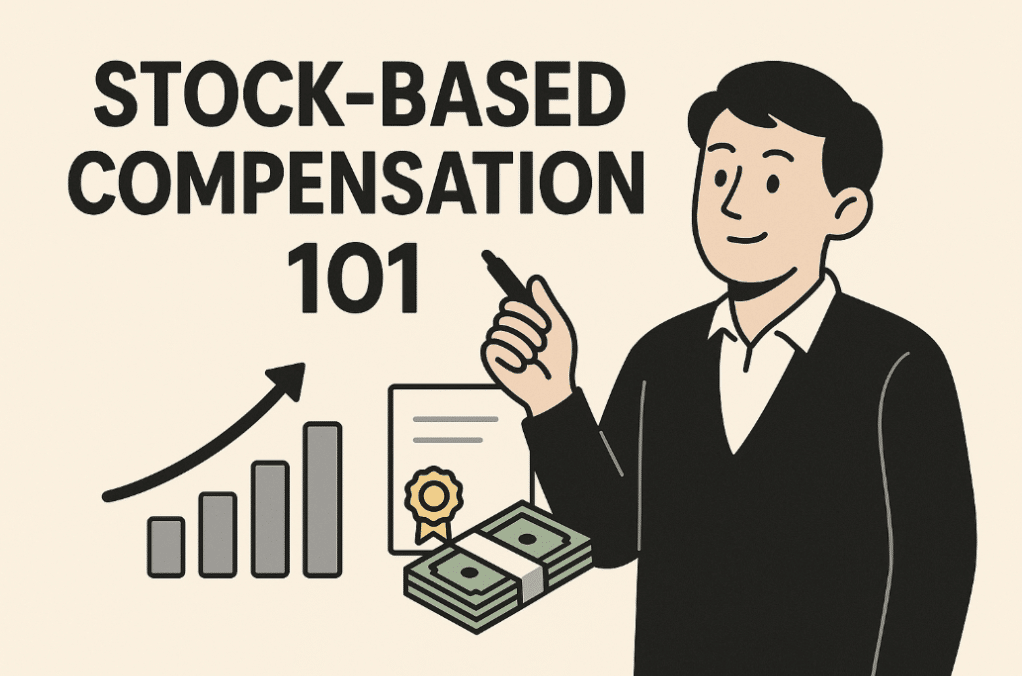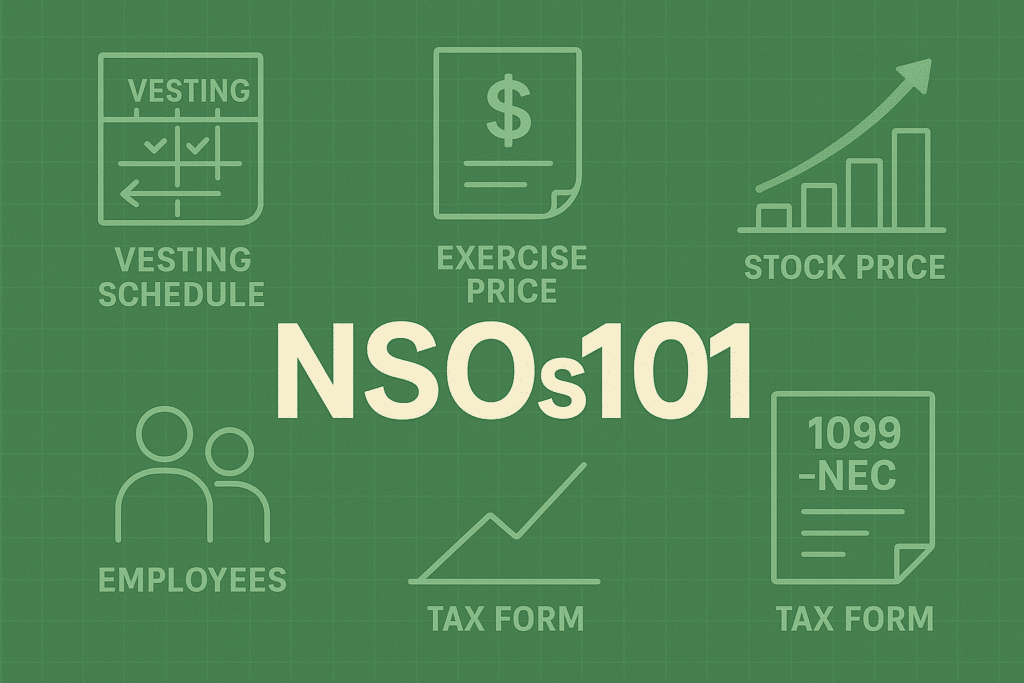If part of your paycheck shows up in the form of company stock, you’re not alone — and you’re also not just getting “extra” perks. Stock-based compensation is a key part of your total income and long-term wealth strategy. But it’s also one of the most misunderstood.
This guide is the first in a broader series where we unpack the different pieces of equity comp — how it works, what it means for your taxes, and how to make smart decisions with it. If you’re working at a public company, startup, or somewhere headed toward an IPO, understanding your stock-based pay isn’t optional. It’s core to your financial future.
Here, we’ll cover the basics: how stock-based comp fits into your overall package, how it’s different from cash, and what kinds of equity you might receive. We’ll also flag some of the planning opportunities and tax issues that often catch people off guard — and explain how it all ties into your bigger financial picture.
The 3 Core Components of Compensation
When people think about what they earn, they usually think about salary, bonus, and sales commissions. But in the past 30 years, many professionals now grapple with compensation that includes more than just a regular paycheck, they sometimes need to understand complex stock-based plans. Here’s how the pieces of modern compensation generally break down:
Salary: This is your base pay — the fixed amount you earn annually, typically paid out biweekly, semi-monthly, or monthly. It’s the most predictable part of your compensation and the one that’s easiest to plan around. Since salary is taxed as ordinary income and shows up on your W-2, there are no surprises here. But it’s not usually where the biggest wealth-building potential lives, especially if your company offers equity.
Bonuses or Commissions: Bonuses and commissions can be tied to your performance, company performance, or both. Sometimes they’re discretionary; other times they’re formulaic and clearly defined in your employment agreement. Like your salary, bonuses and commissions are taxed as regular income. One thing to keep in mind: they’re not guaranteed, and they can fluctuate year to year, so they’re best treated as a variable piece of your income — not something to rely on for fixed expenses.
Stock-Based Compensation: Equity (a.k.a. Stock) is where things get interesting — and more complex. When a company grants you stock or stock options, they’re essentially offering a stake in the future value of the company. This isn’t just a reward for showing up — it’s designed to incentivize long-term thinking and align your success with the company’s. But it comes with strings: vesting schedules, tax rules, and decisions around when (or whether) to sell. That’s where planning becomes important.
The Differences Between Public vs. Private Company Equity
The value — and liquidity — of your stock-based comp depends heavily on whether your company is public or private. That one distinction changes a lot about how you can plan around your equity. Here are some key differences to understand:
Public company equity: This is much easier to work with. Once shares vest, you can typically sell them on the open market — either right away or on a set schedule (especially if you’re an insider with a 10b5-1 plan in place). You’ll have real-time visibility into what your shares are worth, and you can more easily model out the tax impact of exercising or selling.
Private company equity: This comes with more unknowns. You might have options or RSUs that show value on paper, but if the company isn’t publicly traded, you can’t actually sell anything — at least not yet. That makes liquidity a challenge, especially if you’re considering exercising options that require upfront cash. And valuing private shares isn’t always straightforward. The company may provide 409A valuations, but those are often conservative and don’t always reflect the price you’ll get in a future liquidity event.
Please Note: For employees of privately owned companies, pre-IPO equity can be a powerful wealth builder — but also a risky one. Exercising too early can trigger a tax bill without a guaranteed payoff. Waiting too long could leave you with fewer tax planning opportunities. The timing of an IPO, acquisition, or tender offer plays a huge role in whether that equity turns into something usable.
Types of Stock-Based Compensation
Different types of stock-based pay come with different tax rules, vesting schedules, and planning opportunities. Here’s a rundown of the most common types you might encounter:
Restricted Stock / RSU: Restricted Stock and Restricted Stock Units (RSUs) are fairly straightforward. Your company grants you a set number of shares that vest over time — usually as long as you remain employed. Once those shares vest, they’re treated as income and taxed at their market value on that date. That amount shows up on your W-2, whether you sell the shares or not. You don’t pay anything upfront to receive them, which is a big plus. But the downside is that you’re still taxed even if the stock later loses value — making timing and planning especially important.
Incentive Stock Options (ISOs): ISOs offer potential tax advantages, but they also come with strings. These options give you the right to buy shares at a set price (executing the option is commonly known as “exercise”), and if you hold them long enough — two years from grant date and one year from exercise — any profit can be taxed as long-term capital gains. But here’s the tricky part: exercising a large number of ISOs could trigger the Alternative Minimum Tax (AMT), leaving you with a tax bill even if you haven’t sold anything. So while ISOs can be a great tool for building wealth, they require careful planning to avoid surprises.
Non-Qualified Stock Options (NSOs): NSOs are more common than ISOs and generally easier to manage from a tax standpoint. When you exercise NSOs, the difference between the grant price and the current market value is treated as regular income and gets reported on your W-2. You’ll also owe payroll taxes on that amount. If you keep the shares and sell them later, any additional gain is taxed as a capital gain. While NSOs don’t have the same tax advantages as ISOs, they also don’t come with AMT complications — which can make the decision to sell the shares easier.
Employee Stock Purchase Plans (ESPPs): ESPPs let you buy company stock at a discount using payroll deductions. Many plans also offer a “lookback” provision, so you can buy shares based on the lower price at the beginning or end of the offering period. The tax treatment depends on how long you hold the shares. If you meet the holding period requirements — usually one year from purchase and two years from the start of the offering — much of the gain may qualify for capital gains treatment. Sell too early, though, and both the discount and any gains could be taxed as ordinary income.
Other Key Considerations Regarding Stock-Based Compensation
Stock-based compensation doesn’t exist in a vacuum. Taxes, timing, and liquidity all play a role in how valuable your equity actually becomes — and how much of it you get to keep. Below are some of the most important concepts to keep in mind as you build a plan around your stock compensation:
Timing and Liquidity: Just because your shares vest doesn’t mean you can immediately sell them — or that it makes sense to. RSUs are taxed at vesting, while options may trigger taxes at exercise even if you can’t cash out right away. Especially in private companies, liquidity can lag behind the tax bill.
Alternative Minimum Tax (AMT): If you’re granted ISOs, you may face AMT when you exercise and hold your shares. This tax operates alongside the regular system and can result in owing money to the IRS even if you haven’t sold anything. Understanding how AMT works — and how to manage your exposure — is key to avoiding surprises.
IPOs and Tender Offers: A public offering or company buyback can create your first real chance to turn stock into cash — but they also come with new tax and timing questions. Lock-up periods, price volatility, and the calendar year all factor into your decision-making.
83(b) Election: If you’re granted early-exercisable options or restricted stock, you may be eligible to file an 83(b) election. This lets you pay tax on the W2 and payroll tax now rather than later — which can lead to long-term capital gains treatment down the road. But the strategy carries risk and a strict 30-day deadline.
10b5-1 Trading Plan: For executives and insiders, trading your company stock can raise compliance issues. A 10b5-1 plan allows you to pre-schedule trades to avoid conflicts with insider trading rules — while giving you a systematic way to manage a concentrated position.
Stock-Based Compensation FAQs
What’s the difference between RSUs and stock options?
RSUs (Restricted Stock Units) are shares granted to you that vest over time. Once they vest, they’re yours — no purchase required — and the value is taxed as income.
Stock options give you the right to buy shares at a set price (the “strike” or “exercise” price). You have to decide if and when to exercise them, and depending on the type (ISO or NSO), the tax treatment can vary significantly.
When should I sell my RSUs after they vest?
There’s no universal rule, but many people sell RSUs immediately because they need the cash, or wish to avoid concentrating too much of their net worth in their employer’s stock. You’re taxed based on the value at vesting whether you sell or not, so holding the shares exposes you to market declines without any tax benefit. If you need the cash for other goals or want to avoid unnecessary exposure to company stock, selling promptly can be a smart strategy.
What triggers taxes with stock options?
For NSOs, you’re taxed at exercise — the spread between the strike price and market value becomes ordinary income. For ISOs, there’s no regular income tax at exercise, but you may trigger the Alternative Minimum Tax (AMT). When you eventually sell the shares, you pay higher taxes if you sell the stock sooner, than if you wait a prescribed amount of time to sell.
How do I know if I’ll owe AMT from exercising ISOs?
You’ll need to calculate the spread between the strike price and the fair market value of the stock at exercise, and include that amount in your AMT calculation. If that pushes your total AMT income above the exemption threshold, you could owe a separate tax even if you didn’t sell the shares. We help our clients model this before the tax year ends to help avoid any surprises.
Is there a risk to holding too much company stock?
Yes — it’s called concentration risk. If your income, job, and portfolio are all tied to the same company, a downturn could hit you hard. Even strong companies go through volatility. Selling some shares over time and diversifying can help protect your broader financial plan. That said, some employees become far wealthier if they hold their investment in the company they work for (assuming the stock outperforms relative to other more diversified investments). Selling some stock is usually inevitable though and requires forward-looking planning.
Should I early exercise my options and file an 83(b) election?
An 83(b) election can be a smart strategy if you hold early exercisable stock options (like ISOs or NSOs) or receive restricted stock — but it doesn’t apply to RSUs. By exercising early and filing an 83(b), you pay income tax on the value of the shares at the time of grant or exercise, potentially locking in favorable tax treatment if the company grows. Future gains may qualify for long-term capital gains rates, which are often lower than ordinary income tax.
However, this move carries risk. You’re paying tax upfront on stock that may never become liquid or could drop in value. If the company fails or doesn’t provide a liquidity event as expected, you might regret it. The 83(b) election must also be filed within 30 days of exercise or grant — no exceptions. Because the stakes can be high, it’s worth running the numbers and speaking with a tax professional before making a decision.
What’s a 10b5-1 plan and should I have one?
A 10b5-1 plan is a pre-set trading schedule that lets you sell company stock without violating insider trading rules. It’s especially useful if you regularly receive new shares or have access to confidential information. These plans can help you diversify over time while staying compliant, and remove the stress of trying to time the market or sell during inopportune windows of time.
How are ESPPs taxed, and what’s a qualifying disposition?
With ESPPs, you usually don’t pay tax when you buy the shares, but you will when you sell. If you hold the shares long enough — generally two years from the start of the offering period and one year from purchase — the sale is a qualifying disposition, and most of the gain may be taxed as capital gains. Selling sooner results in a disqualifying disposition, which often means more the discount is taxed at ordinary income rates.
How do I keep track of all this — vesting, taxes, holding periods?
It’s a lot to manage, and most companies don’t give you much support. Do your own research or hire a financial advisor who specializes in stock-based compensation planning. Start with a spreadsheet or app to track your grants, vesting dates, exercise windows, and sale transactions. Beyond that, working with a professional who understands equity comp can help you model different scenarios and build a strategy around your unique goals and timeline. Don’t forget, your psychology plays a huge role, and inviting competent professionals onto your team can protect yourself from self-induced harm.
We Can Help You Make the Most of Your Stock options
Equity compensation can be a major driver of long-term wealth — but it often comes with more complexity than clarity. Between vesting schedules, tax exposure, and shifting company valuations, many employees are left guessing how and when to make the most of their stock. Without a coordinated plan, it’s easy to miss opportunities or trigger avoidable tax bills.
That’s where we come in. Our firm works with professionals to help untangle the details and build personalized strategies. Whether you’re trying to understand your first RSU grant or deciding how to handle a large ISO exercise, we help you weigh liquidity needs, tax treatment, market risk, and your bigger financial picture.
We also track key dates and decisions with you — like 83(b) deadlines, option expiration windows, or post-IPO lockup periods — so you’re not scrambling to react. And when equity intersects with cash flow, retirement planning, or estate considerations, we make sure everything stays aligned. If you already work with a CPA or attorney, we’ll collaborate. If not, we’ll help you find the right partner.
If your compensation includes equity, your financial plan should too. Schedule a complimentary consultation with our team to get clarity on your stock options, reduce tax surprises, and start building a plan that works for you — not just your employer.












